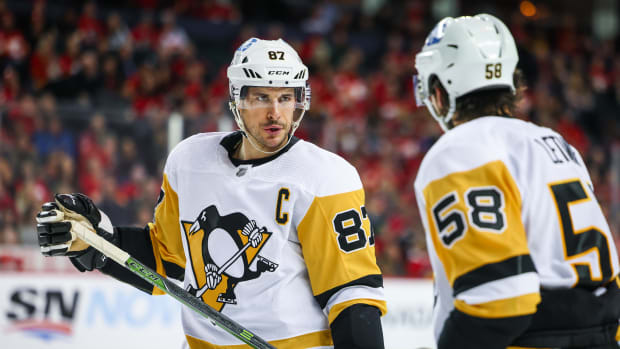When the Vancouver Canucks hosted the Pittsburgh Penguins on Friday night at Rogers Arena, a scene unfolded that hockey fans have seen countless times before, with only slight variations.
With the Penguins down 2-0 late in the second period and J.T. Miller in the penalty box late after high-sticking Sidney Crosby, the Pittsburgh captain easily won the ensuing draw after the TV timeout.
Then, the cycle began. Power-play fixtures Crosby, Malkin, Letang and Bryan Rust, along with newcomer Rickard Rakell, moved the puck around the zone for 80 seconds, with only a couple of quick clears by Vancouver. Eventually, Rust got a shot on net, creating some chaos. The Penguins closed in, Rust fired a one-timer from the slot and Rakell corralled the rebound, sneaking behind aggressive Vancouver netminder Spencer Martin to backhand the puck into the net and cut the lead to 2-1.
During their back-to-back championship years in 2016 and 2017, the Penguins’ power play regularly connected at close to 20 percent or better in both the regular season and the playoffs. Crosby, Malkin, Letang and Phil Kessel were all among the league’s top producers with the man advantage.
Five years later, Pittsburgh’s power-play personnel looks much the same. And at 8-for-33 over eight games for a success rate of 24.2 percent, it still delivers.
But Rakell’s goal on Friday night was also the only shot that beat Spencer Martin. The Penguins fell 5-1 to the Canucks and dropped to 0-3-0 on this week’s tour through Western Canada.
It’s a harsh comedown for a group that started the season at 4-0-1. Through those first five games, Pittsburgh outscored its opposition 26-11, and Crosby earned the season-opening first star of the week honours after he put up six points in the first two games of his franchise-record-setting 18th season with the Pens. He stormed out of the gate with 11 points in his first six games before being held off the scoresheet in Calgary on Tuesday, a 4-1 loss, as well as in Vancouver.
Add in Monday’s 6-3 loss in Edmonton and the Penguins have been outscored 15-5 this week. And they’ve scored just two goals at even strength — both as part of the early 3-1 lead they built against the Oilers before surrendering five straight.
The Penguins will still have a chance to salvage something from this road trip. They’re right back in action against the Kraken in Seattle on Saturday night.
“We have a great team,” said Evgeni Malkin after the game. “If we do the right things and we win tomorrow, we are not in a bad position right now. It’s a long season … We just want to win.”
With his secondary assist on Rakell’s goal, Malkin is up to eight points for the year and has tallied at least one point in all but one game so far. It’s the kind of production that Pittsburgh GM Ron Hextall and president Brian Burke were hoping for when they re-upped the 36-year-old on a four-year deal this summer, with a cap hit of $6.1 million per season.
Letang, 35, was re-signed for six years at that same hit of $6.1 million, and Rust, 30, got six years at $5.125 million. Rakell, a new arrival at the 2022 trade deadline, also got a six-year extension with a $5 million average annual value.
Signing older players to multi-year deals always carries an element of risk. But the Penguins found themselves in a unique situation when they had the chance to keep the band together while Crosby is still under contract for another three seasons.
In the salary-cap era, the Penguins are the only Cup-winning franchise to successfully retool before coming back to win another championship. Yes, the Chicago Blackhawks won three titles in six years and the Los Angeles Kings picked up two Cups in three seasons. But seven years elapsed between the Penguins’ championship in 2009 and their titles in 2016 and 2017.
Crosby, Malkin and Letang were common threads. But management had changed during that time, from Ray Shero to Jim Rutherford. Coaching went from Dan Bylsma to Mike Johnston to, eventually, Mike Sullivan. Marc-Andre Fleury began to cede the net to Matt Murray. And the 2009 veterans like Bill Guerin, Sergei Gonchar and Ruslan Fedotenko were replaced by the “HBK Line,” Matt Cullen and Patrik Hornqvist by 2016.
With so much money tied up with their franchise icons, do the Penguins have a strong enough supporting cast to take another meaningful run at the Cup before Crosby’s contract expires? Their playoff performance last spring suggests that they’re close, after pushing the Rangers to seven games despite being down to their third-string goaltender and missing Crosby for Game 6 due to injury.
Injuries could also be part of the reason why the Penguins are currently struggling out west. After posting the NHL’s best penalty kill last season, they’re at just 69 percent this year without the services of Teddy Blueger, who is sidelined with an injury.
Two other important complementary forwards are also on the shelf. Jake Guentzel had five points this year before he was sidelined in Game 4 with an upper-body injury, while oft-injured Jason Zucker had been chipping in at a point-a-game pace before missing the last two games with an undisclosed issue.
As Malkin said, this mini-swoon hasn’t hurt them in the standings — yet. With nine points in eight games, the Penguins are one point out of first place in the Metropolitan Division and hold down the first wild-card spot after Friday’s games. But eight teams in the Eastern Conference have eight points, and 24 of the league’s 32 clubs are in action on Saturday, including Pittsburgh in Seattle.
It’s a little early for a must-win. But two points would do a lot to make the long flight back to Steel City a little more bearable — and restore management’s faith in the decision to re-commit to the stars.



